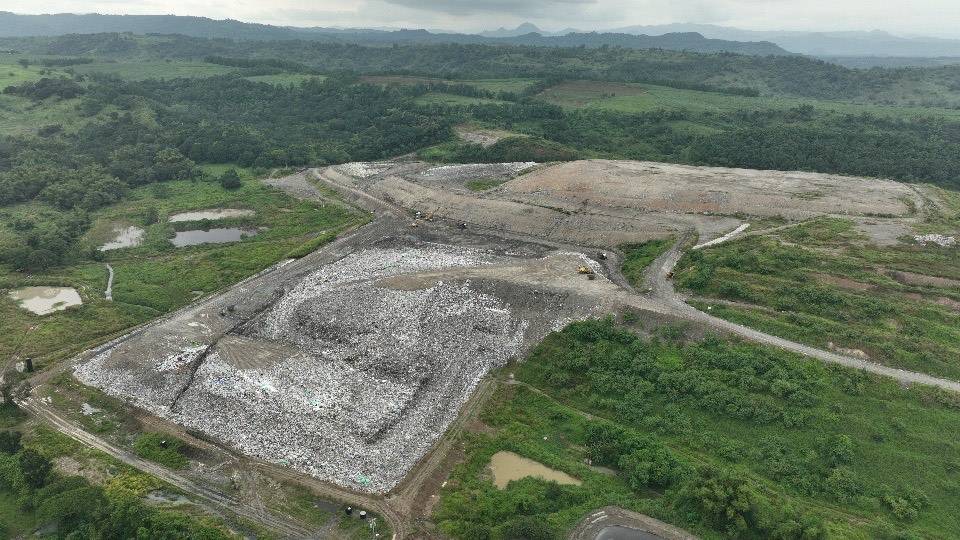Clark body asserts Tarlac landfill to stay closed despite court injunction

MABALACAT CITY—The Clark Development Corp. (CDC) has clarified that a regional trial court (RTC) did not allow the 100-hectare sanitary landfill in the Clark Special Economic Zone in Capas, Tarlac, to remain open.
CDC communications division manager Astrud Aguinaldo said in a Nov. 4 letter to the Inquirer that the writ of preliminary injunction issued by Capas Regional RTC Branch 66 only prevents the CDC and its mother company, the Bases Conversion and Development Authority (BCDA), from forcibly taking over the Kalangitan Sanitary Landfill.
Aguinaldo said the landfill operator, the Metro Clark Waste Management Corp. (MCWMC), is still not authorized to stay open.
In issuing a five-page writ of preliminary injunction on Oct. 29, Capas RTC Branch 66 Judge Ronald Haban said that CDC president Agnes Devanadera and BCDA President Joshua Bingcang and their respective security forces were barred from carrying out a forcible takeover of the landfill area.
Aguinaldo asserted that the injunction did not permit MCWMC to continue to operate, as “the regulatory power to authorize [the] operation [of the landfill] resides solely with the CDC.”
“Without the necessary authority to operate issued by the CDC, MCWMC is categorically prohibited from conducting any operations,” she said.
Aguinaldo said MCWMC’s 25-year build-operate-transfer contract for services and its authority to operate had expired on Oct. 6.
She said the CDC issued a cease-and-desist order and a notice to the MCWMC on Oct. 25 to peacefully vacate and return the landfill area to the government, but the latter refused to accept the documents.
Aguinaldo also cited the Oct. 21 dismissal by the Angeles City RTC Branch 114 of the MCWMC’s civil case seeking the automatic renewal for another 25 years of its contract for services with the CDC “for lack of merit.”
However, the landfill was still operating as of Saturday.
The MCWMC stopped operating on Oct 25, a day after the expiration of the 20-day temporary restraining order issued by the Capas RTC against the CDC and BCDA. But when the same court issued the writ of preliminary injunction against the two government entities on Oct. 29, the MCWMC resumed its operation.
In a statement on Nov. 9, MCWMC said that aside from barring the CDC and the BCDA from taking over the landfill, the court injunction also barred the two firms from taking any action that would undermine or disrupt MCWMC’s operations.
“CDC/BCDA’s position is legally flawed and factually incorrect. The writ of preliminary injunction remains in full force, preventing any acts that would disrupt MCWM’s operations or result in a forcible eviction,” it said.
Clients
In a Viber message on Nov. 9, MCWMC executive vice president Victoria Gaetos said they started accepting again garbage from their clients, including local governments and companies that treat medical wastes, on Oct. 29.
Gaetos said despite the notices given earlier by the CDC to local governments, advising them to find alternative landfills for their wastes, more than 100 local governments in central and northern Luzon continue to patronize the Kalangitan landfill.
She said companies involved in collecting and handling medical and treated hazardous wastes do not have any alternative dumpsites and also continue to patronize the upland sanitary landfill inside the Clark ecozone.
“The garbage from Clark was contracted by CDC to be handled by Prime (Prime Waste Solutions Pampanga) because, according to guidelines, the MCWMC is disqualified (because CDC’s requirements say that the waste collector must be based outside of Clark). The SBMA (Subic Bay Metropolitan Authority) is still with us because we are contracted by them until 2025,” she added.
The CDC and BCDA are expected to take legal action before the Capas court for the latter to withdraw the injunction or to raise the dispute before the Courts of Appeal to invalidate the injunction.
These firms have installed posters and streamers along the road leading to the Kalangitan landfill, informing the public that MCWMC no longer has the authority to operate.
Prime Wastes Solutions Pampanga, a wholly owned subsidiary of the Razon-led Prime Infrastructure Capital Inc. and one of the three alternative waste management facilities earlier identified by the BCDA, opened its automated materials recovery facility, which could accommodate 5,000 metric tons (MT) of garbage daily, in Porac on June 5 and started collecting residual wastes from companies and residential units in Clark Freeport on Oct. 6.
The other two alternative waste management facilities are Eco Protect Management Corp.’s engineered sanitary landfill, which is also located in Porac and has 2,500 MT daily capacity, and the Floridablanca Enviro Park Project of Berjaya Philippines Inc. in Floridablanca, an engineered sanitary landfill with a daily capacity of 3,500 MT.

















